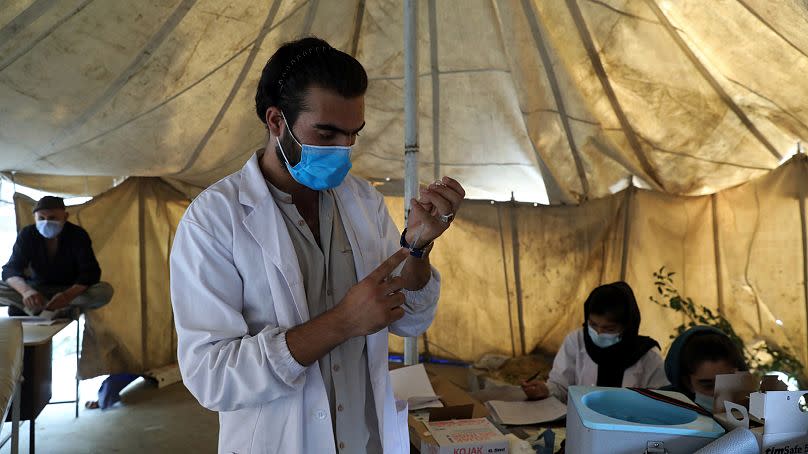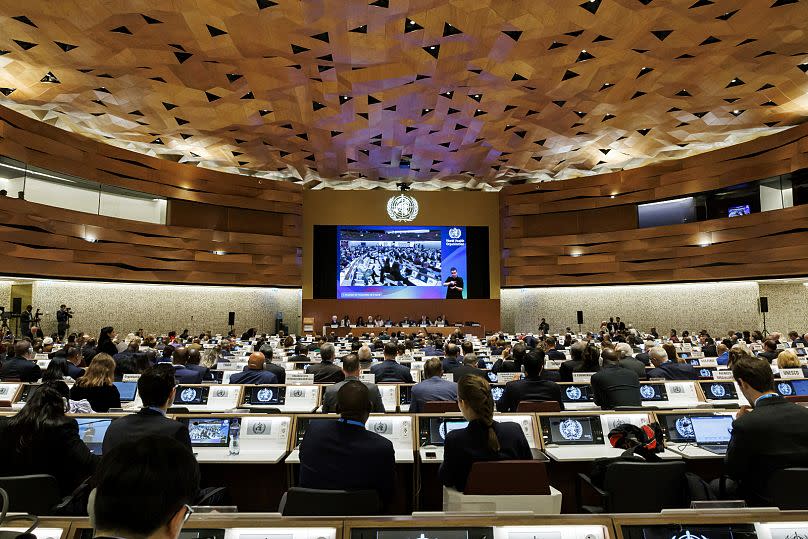A pandemic treaty to avoid COVID mistakes has been 2 years in the making. Why can’t countries agree?

After more than two years of working to prevent some of the problems seen during the COVID-19 pandemic, countries have given themselves another year to hammer out the final details of a pandemic treaty.
In the weeks leading up to a May deadline that was not met, diplomats working on the negotiations told Euronews Health they would sometimes argue over a paragraph of text for three to four hours with long nights and intense discussions to meet an overly ambitious timeline.
While several negotiators said they were optimistic about the prospect of coming to an agreement, they also expressed concerns that some of the challenges were related to age-old geopolitical differences that are not easy to iron out.
Why create a pandemic treaty?
“The sort of biggest drama in a way that developed during COVID-19 was the complete falling apart of solidarity between the countries,” said Ellen ’t Hoen, director of the organisation Medicines Law and Policy.
“That vanished as soon as the vaccines emerged. That the vaccines were developed so rapidly, that was fantastic. It was a result of massive government financing, but the governments that put the money up also said we want to be first in line,” she added.
“There was no sharing of the vaccine in an equitable manner”.
The goal of a pandemic treaty is in part to prevent this failure, with an agreement under the World Health Organization (WHO).
But countries disagree on how to do so, with the main obstacles related to access to intellectual property, technology, and know-how as well as the sharing of therapeutics and vaccines.
“On the one hand, everyone agrees that expanding manufacturing capacity in various regions of the world is very important. But then the next step is to say that also means that we will share the technology that we have and that we have kept from you so far. That step is the sticking point that becomes very difficult,” ’t Hoen said.
Two diplomats compared a potential agreement to the UN climate change COP meetings or the Paris Climate Accord, with the idea of a treaty that could provide new international cooperation on pandemics.
It will change things, according to a diplomat from an EU country who spoke on the condition of anonymity, but it will not be a perfect agreement to solve all future pandemics.
Instead, the diplomat saw it as more of a legal basis that encourages cooperation.

‘Underlying differences’
Experts and diplomats agreed that the heart of the agreement is a new instrument called the pathogen access and benefits sharing (PABS) system, where the main idea is that countries share information about emerging diseases in exchange for access to vaccines and medicine.
It would have countries “commit to a rapid sharing of pathogen information, so when they spot something, they quickly put it in a database so countries can prepare, can start developing technologies, can start developing products,” said Piotr Kolczynski, Oxfam’s EU health policy advisor.
In exchange, countries use the system to access products, but diplomats said there are outstanding differences about how it will work.
Countries still need to agree on a contribution from manufacturers of a percentage of safe vaccines and therapeutics to share during a public health emergency.
Campaigners say there’s been little movement from high-income states on obliging companies to share, while some diplomats from those countries argue states need to compromise and that the agreement can’t change the world order.
Mohga Kamal-Yanni, a senior policy advisor to the People Medicine Alliance, said that developing countries generally want “a binding commitment to benefit-sharing”.
“Developed countries, the North wants a commitment to surveillance and One Health and sharing pathogen [information] immediately,” she added. One Health recognises the connection between the health of people, animals, and the environment.
“The South wants more committing language on technology transfer while the North wants it to be basically what it is now,” said Kamal-Yanni, with companies deciding what and when to share products.
“There are underlying cleavages in global health that have existed for the last 20 to 30 years that have worsened with the pandemic, it’s [about] access to innovation and research priorities,” said Jaume Vidal, senior policy advisor on European Projects at Health Action International.
In the current draft of the treaty, there are additions in brackets urging manufacturers to “voluntarily” share information, but some experts want stronger language.
“Maybe the nature of global public international law is that you don't sanction countries directly,” said Yuanqiong Hu, a senior legal and policy advisor at Médecins Sans Frontières (Doctors Without Borders).
“But the language should reflect actionable obligations so that when it comes to the implementation stage, you have some clear obligation to check whether any government actually performed in that,” she added.
One diplomat from an EU country said that each country wants to add caveats in line with their own interests, with lots of changes to arrange each of the different stakeholders in the agreement.
Disagreements over pharmaceutical companies’ role
A senior US administration official told Euronews Health that the country had a strong interest in ensuring that what happened during the pandemic, where low and middle-income countries watched vaccines roll out in high-income countries for months before having access, does not happen again.
The official, who spoke on the condition of anonymity about the negotiations, said that as the private sector operates independently of the government, the US could not sign an agreement on behalf of private companies and that it was key to build something that industry would also decide to opt-into.
The International Federation of Pharmaceutical Manufacturers and Associations (IFPMA), the global voice of the industry said that given their role in “researching, developing, and delivering” pandemic countermeasures, “it’s paramount that industry is at the table so that we can contribute constructively to the dialogue”.
“Industry has committed to playing our part in addressing the inequities in real-time access,” director-general David Reddy said in a statement provided to Euronews Health.
A diplomat from a developing country lamented that some of Global North countries’ positions were aligned with major manufacturing companies and added that low and middle-income countries are also not trying to redraw the entire global system but needed to agree on a firm position.

Some say the European Union, like others in the G7, has been too close to the position of industry, specifically on issues relating to intellectual property.
“The Commission is speaking on behalf of the EU member states, and its alignment with the position of the industry is really striking,” said Kolczynski.
This view was echoed by two diplomats from high-income countries who spoke to Euronews Health.
As the Commission is driving the negotiations, the member states follow the EU's lead as one negotiating bloc, and some diplomats say the bloc is stronger as 27 states together.
Another diplomat from an EU country, who also spoke on the condition of anonymity, said that there was not always a balance between the different member state positions and that there will need to be an evaluation down the line about the negotiations.
The European Commission would not comment on specific aspects of the pandemic agreement negotiations but a spokesperson told Euronews Health that the “EU remains fully committed to the conclusion of a Pandemic Agreement that would create a stronger, more resilient and more equitable global health architecture worldwide”.
'Trying to find solutions’: Worsening drugs shortage is leaving pharmacists and patients in the dark
Will interest in negotiations wane?
Negotiators have agreed to give themselves up to a year to finish the treaty discussions and are set to meet in July to determine the rules for the next steps.
The World Health Assembly - the decision-making body of the WHO - was marked by amendments to the International Health Regulations (IHR), legally binding rules for countries that apply to the WHO.
These amendments include a financial mechanism to address the needs of developing countries.
Several diplomats said there is hope that the momentum of finalising those changes will lead to renewed motivation for the treaty instead of the IHR being viewed as a sufficient step to tackle pandemics.
The senior US administration official confirmed the IHR was not the “whole puzzle” and that the country remains committed to the pandemic treaty negotiations.
Experts and diplomats agreed that negotiators must stick to what has already been agreed if the treaty is to be finalised over the next year.
Many also said there needed to be clearer rules and better organisation of the negotiating body for the rest of the discussions.
The extension of negotiations, for some, could also be seen as a win, as it shows that countries are still willing to continue discussing the treaty, even as it has come under attack from right-wing commentators falsely accusing the WHO of a power grab.
Keeping engagement and the importance of the pandemic threat in the room is also key, campaigners said.
“It's really important that no one has yet left the table. I'm not saying that this could not happen in the future, but it hasn't happened yet,” said Vidal from Health Action International.

 Yahoo News
Yahoo News 
